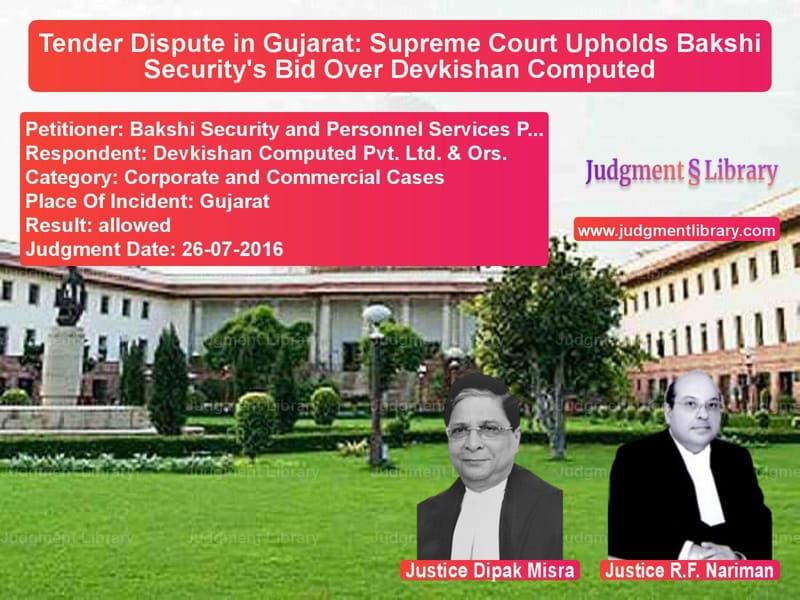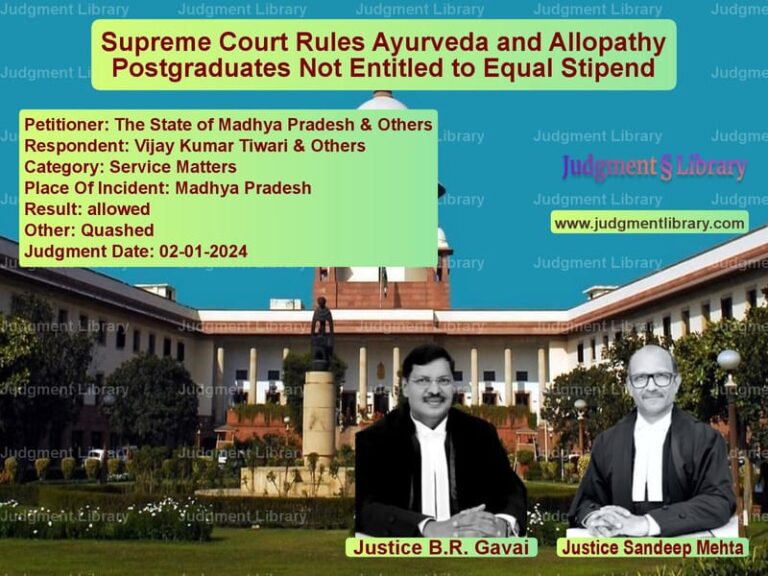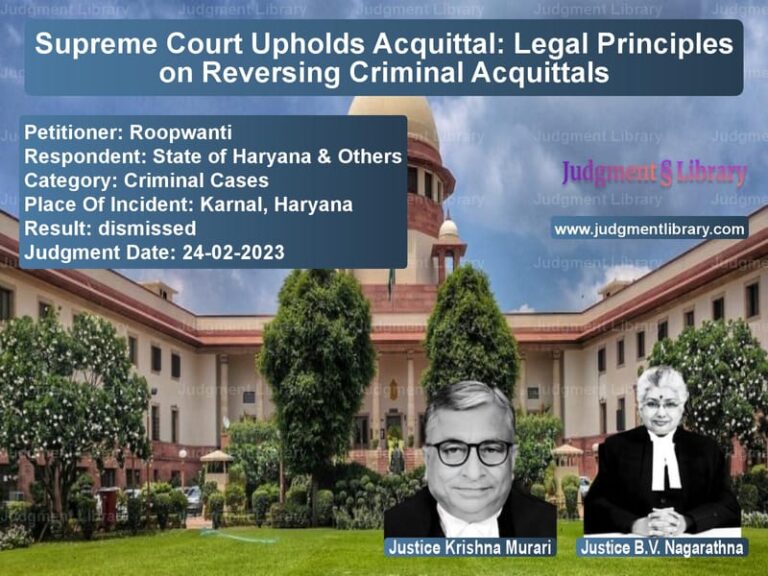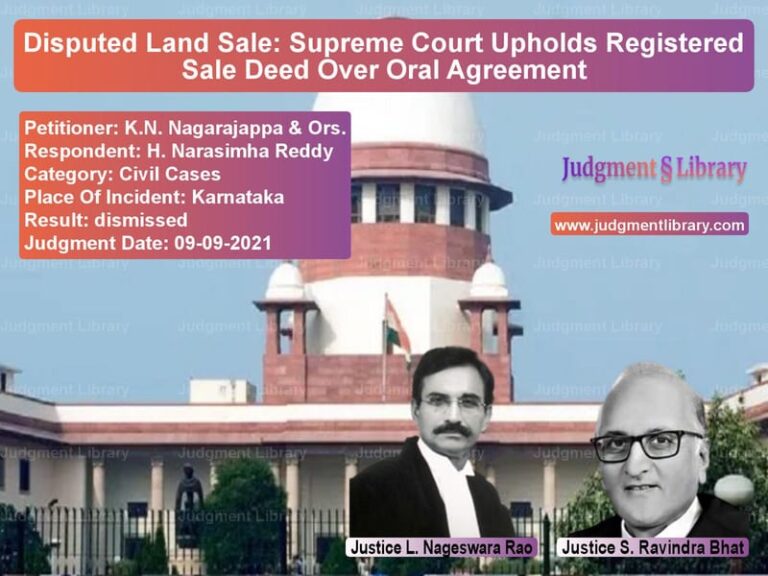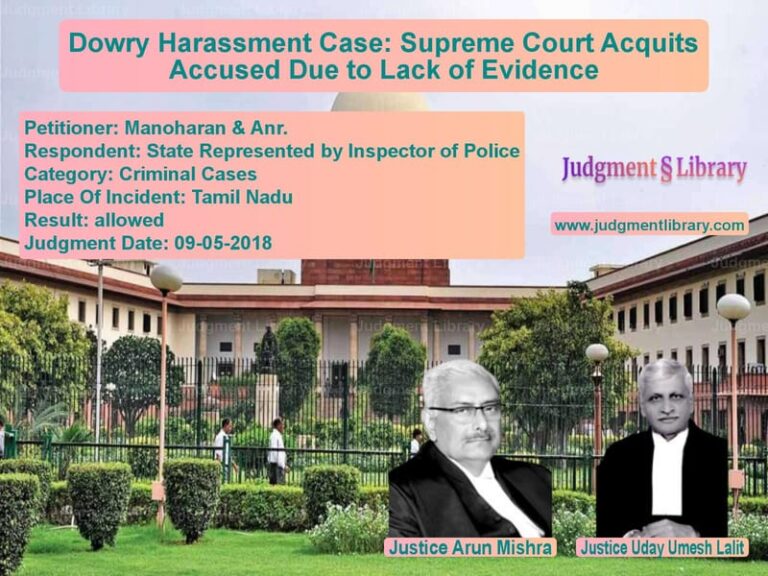Tender Dispute in Gujarat: Supreme Court Upholds Bakshi Security’s Bid Over Devkishan Computed
The Supreme Court of India recently delivered a landmark judgment in the case of Bakshi Security and Personnel Services Pvt. Ltd. v. Devkishan Computed Pvt. Ltd. & Ors.. This case revolved around a government tender dispute in Gujarat and highlighted significant issues in public procurement, tender compliance, and judicial intervention. The Court’s decision reaffirmed the principle that government tenders must adhere to their specified conditions and that judicial interference in contractual matters should be limited.
Background of the Case
On 20th November 2014, the Commissioner of Transport, Government of Gujarat, issued a tender inviting bids for outsourcing manpower services at 11 RTO check-posts. The tender covered various job roles, including supervisors, computer programmers, data entry operators, and electricians. The financial bids were opened on 10th December 2014, and nine companies participated in the bidding process. However, only three of these bidders qualified for the financial round:
- Bakshi Security and Personnel Services Pvt. Ltd. – Rs.2,92,93,944/-
- Devkishan Computed Pvt. Ltd. – Rs.2,77,68,000/-
- Airan Consultants Pvt. Ltd. – Rs.3,03,83,184/-
After evaluating the bids, the Technical Evaluation Committee, in consultation with the Labour Department, determined that the minimum wage payable under the contract was Rs.3,00,92,346/-. This figure was derived to ensure compliance with statutory labor laws, including the Minimum Wages Act, the Payment of Wages Act, and other relevant regulations.
Key Issues in the Tender Process
The primary controversy arose when the government disqualified both Bakshi Security and Devkishan Computed, as their bids were below the minimum wage requirement. As a result, the contract was awarded to the third-highest bidder, Airan Consultants Pvt. Ltd.
Devkishan Computed challenged this decision before the Gujarat High Court, arguing that bidders were not given an opportunity to revise their offers in light of the minimum wage determination. The High Court ruled in favor of Devkishan Computed, setting aside the contract awarded to Airan Consultants and allowing all bidders to resubmit their proposals.
Arguments by the Petitioner (Bakshi Security)
Bakshi Security, aggrieved by the High Court’s decision, approached the Supreme Court, arguing the following points:
- Violation of Tender Conditions: Devkishan Computed’s initial bid was below the minimum wage requirement, making it ineligible.
- Prohibition of Open-Ended Bids: The tender conditions clearly stipulated that bids had to be fixed-price and non-negotiable.
- Judicial Overreach: The High Court’s decision allowing Devkishan Computed to revise its bid contradicted well-established principles of tendering and public procurement.
- Unfair Advantage: Allowing a revision after submission gave Devkishan Computed an undue advantage over the other bidders.
Arguments by the Respondent (Devkishan Computed)
Devkishan Computed defended the High Court’s ruling, arguing:
- Lack of Transparency: The government failed to disclose the minimum wage figure before inviting bids, causing confusion among bidders.
- Public Interest: Allowing the lowest bidder to match the minimum wage would result in cost savings for the government.
- Good Faith Commitment: Devkishan Computed had voluntarily undertaken to meet statutory wage requirements despite its lower bid.
- Judicial Discretion: The High Court had the authority under Article 226 of the Constitution to ensure fairness in the tender process.
Supreme Court’s Observations and Judgment
After considering the arguments, the Supreme Court examined key aspects of the tendering process and emphasized the following:
- Strict Compliance with Tender Conditions: The Court noted that under Clause 2.5.5, bids had to strictly conform to the specified format, and any deviation rendered the bid ineligible.
- Prohibition on Open-Ended Bids: Clause 2.5.6 expressly forbade open-ended pricing, which Devkishan Computed’s revised bid effectively was.
- Judicial Overreach: The Court held that courts could not modify or renegotiate contracts between parties, as doing so would interfere with commercial and administrative decisions.
- Public Interest and Tendering Integrity: Allowing post-bid modifications would undermine the integrity of the tendering process and set a dangerous precedent.
The Court ultimately ruled in favor of Bakshi Security, overturning the Gujarat High Court’s decision and allowing the government to proceed with awarding the contract to the appellant.
Conclusion
This case underscores the importance of strict compliance with tender conditions and the limited scope of judicial intervention in contractual matters. The Supreme Court reaffirmed that government procurement must adhere to clearly defined rules and that post-bid negotiations cannot be entertained to suit individual bidders.
Don’t miss out on the full details! Download the complete judgment in PDF format below and gain valuable insights instantly!
Download Judgment: Bakshi Security and vs Devkishan Computed P Supreme Court of India Judgment Dated 26-07-2016-1741873405071.pdf
Direct Downlaod Judgment: Direct downlaod this Judgment
See all petitions in Company Law
See all petitions in Corporate Governance
See all petitions in Contract Disputes
See all petitions in Judgment by Dipak Misra
See all petitions in Judgment by Rohinton Fali Nariman
See all petitions in allowed
See all petitions in supreme court of India judgments July 2016
See all petitions in 2016 judgments
See all posts in Corporate and Commercial Cases Category
See all allowed petitions in Corporate and Commercial Cases Category
See all Dismissed petitions in Corporate and Commercial Cases Category
See all partially allowed petitions in Corporate and Commercial Cases Category

